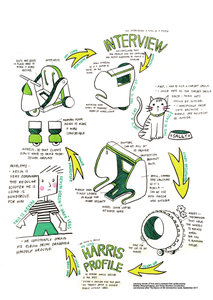Globalization, accelerating technological advancements and the increasing unpredictability and demanding nature of clients have a major impact on the context in which companies operate. Companies are compelled to create a stream of innovations, both technological and organizational, in order to adapt to the continuously changing environment. In addition companies will more and more innovate in collaboration with clients, competitors and research institutes, ever more in an international context. Looking at the Netherlands though, the innovative capacity is lagging behind. One of the underlying problems is the lack of technical background and research experience in company management. Another is the low availability of higher educated personnel with a scientific or technical background, thereby creating a vicious circle. A well-prepared engineering workforce is necessary that is able to collaborate in interdependent relationships and that can manage multiple innovation projects. It demands a T-shaped engineer that has in-depth knowledge of one discipline and a broad knowledge base in adjacent areas or in general business or entrepreneurial fields. Nevertheless, this profile will not be created by regular education. Interaction with the work field-with entrepreneurs, researchers and experts-and between students will enable the necessary learning experiences. One of the programmes that the University of Applied Science, School of Technology, has created to accommodate this, is 'The Innovation Lab'. In this highly interactive environment engineering students with various backgrounds (mechanical engineering, electrical engineering, product design and entrepreneurship) work together in interdisciplinary project teams on current innovation ideas and assignments of real companies. The Innovation Lab will serve as an example in this presentation on how the University of Applied Science, School of Technology, is preparing students for a future in innovative organizations. With a T-shaped profile young engineers are better prepared to act successfully in an open innovation environment and can bring technology back in company management. Moreover, this versatility will make technology and design education more attractive for scholars that are faced with a choice for technology education.
LINK
Industrial Design Engineering [Open] Innovation (IDE) is a 3-year, English taught, VWO entry-level, undergraduate programme at The Hague University of Applied Sciences (THUAS). The IDE curriculum focuses on the fuzzy front end of (open) innovation, sustainable development, and impact in the implementation phase of product-service design. The work field of Industrial Design Engineering and Open Innovation, like many other domains, is growing increasingly more complex (Bogers, Zobel, Afuah, Almirall, Brunswicker, Dahlander, Frederiksen, Gawer, & Gruber, 2017). Not only have the roles of designers changed considerably in the last decades, they continue to do so at increasing speed. Therefore, industrial design engineering students need different and perhaps more competencies as young professionals in order to deal with this new complexity. Moreover, in our transitional society, lifelong learning takes a central position (Reekers, 2017). Students need to give their learning path direction autonomously, in accordance with their talents and interests. IDE’s Quality & Curriculum Committee (QCC) realized in 2015 there is too much new knowledge to address in a 3-year programme. Instead, IDE students need to learn how to become temporary experts in an array of topics, depending on the characteristics of each new project they do (see Textbox 1). The QCC also concluded that more than just incremental changes to the current curriculum were needed; thus, the idea for a flexible, choice-based semester approach in the curriculum was born: ‘Curriculum M’ (Modular). A co-creational approach was applied, in which teaching staff, students, alumni, prospective students, industry (including the (international) social profit sector), and educational advisors collaborated to develop a curriculum that would allow students to become not just T-shaped (wide basis, one expertise) professionals, but U- or W-shaped professionals, with strong links to other disciplines.
DOCUMENT

The pace of introduction of new technology and thus continuous change in skill needs at workplaces, especially for the engineers, has increased. While digitization induced changes in manufacturing, construction and supply chain sectors may not be felt the same in every sector, this will be hard to escape. Both young and experienced engineers will experience the change, and the need to continuously assess and close the skills gap will arise. How will we, the continuing engineering educators and administrators will respond to it? Prepared for engineering educators and administrators, this workshop will shed light on the future of continuing engineering education as we go through exponentially shortened time frames of technological revolution and in very recent time, in an unprecedented COVID-19 pandemic. S. Chakrabarti, P. Caratozzolo, E. Sjoer and B. Norgaard.
DOCUMENT
